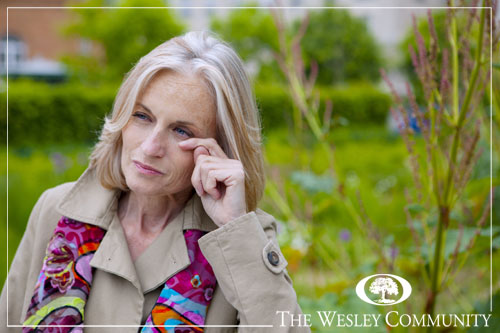Allergy season is upon us again. These tips can help you keep a senior loved one healthy and safe this spring.

After a long winter, most people are glad to see spring return, with its warm weather and blue skies. Sunny days boost the spirit and leave us with a sense of renewal. Unfortunately, sunshine and better weather aren’t the only things that reappear in the spring. Pollen-producing plants also make a comeback. For seniors who have allergies, spring can be more than a little uncomfortable.
Battling Spring Allergies
Scratchy eyes, fatigue, fever, and a stuffy nose are common signs of allergies. Cardiac and pulmonary conditions can also worsen as the pollen count rises. Navigating spring allergy season can be difficult for older adults, especially those with underlying health problems.
Physicians frequently ask older patients to refrain from taking over-the-counter allergy medications. Those that aid in reducing uncomfortable allergy symptoms often cause an increase in blood pressure. Some may also interfere with prescription medications.
What can you do to make spring allergy season a little safer and more enjoyable for your senior loved one? We have a few survival tips for you to review.
4 Ways to Help a Senior Cope with Allergies
- Monitor the pollen count: Some days have a higher pollen count than others. Your local television news station likely provides weekly forecasts of the good days and the bad days. Sign up for their weather alerts to stay updated. National websites like The Weather Channel and Pollen.com are also helpful resources. Plan outdoor activities for days and times when the pollen count will be lower, and stay indoors when the count is high.
- Keep windows closed: Keeping the windows open and turning the air conditioning off can be easier on the budget. During peak allergy season, however, it allows allergens and molds to enter the house. When pollen is at its peak, use your air conditioning. Another good way to protect indoor air quality is to purchase an air purifier. It helps eliminate dust, pollen, mold, and pet dander. Be sure to change the filters on the air purifier and air conditioner as directed. The Wesley Community is pet friendly – get more info!
- Cover up outdoors: On hot days, wearing a short-sleeved top and shorts when you are outside might be more comfortable. For allergy sufferers, it’s better to wear a long-sleeved shirt, pants, sunglasses, and hat. It helps prevent pollen and mold from getting on your hair, skin, and in your eyes. When you come back inside, remove all your clothes in the laundry room or garage and then wash them right away.
- Vacuum regularly: Another way to keep allergies at bay is by vacuuming several times a week. A bagless vacuum with a built-in HEPA filter is both convenient and allergy-friendly. The 6 Best Vacuums for Allergies of 2020 rates the top vacuums in categories ranging from Best Canister to Best High-End.
If a senior loved one’s allergies persist despite your best prevention efforts, call your primary care physician. They may have other treatment options to try that won’t elevate your family member’s blood pressure.
Bookmark The Wesley Community Blog
If you are interested in topics related to aging well, caregiving, and senior care, we encourage you to bookmark our Senior Strategies blog. We update it throughout the month with new articles and resources!

